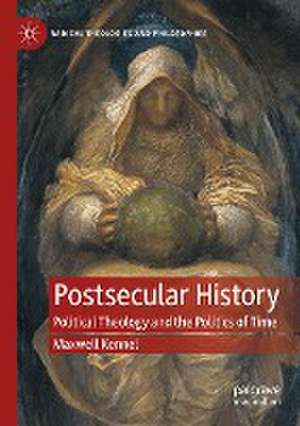Postsecular History: Political Theology and the Politics of Time: Radical Theologies and Philosophies
Autor Maxwell Kennelen Limba Engleză Paperback – 14 noi 2022
| Toate formatele și edițiile | Preț | Express |
|---|---|---|
| Paperback (1) | 722.26 lei 6-8 săpt. | |
| Springer International Publishing – 14 noi 2022 | 722.26 lei 6-8 săpt. | |
| Hardback (1) | 728.43 lei 6-8 săpt. | |
| Springer International Publishing – 14 noi 2021 | 728.43 lei 6-8 săpt. |
Din seria Radical Theologies and Philosophies
-
 Preț: 380.63 lei
Preț: 380.63 lei -
 Preț: 376.22 lei
Preț: 376.22 lei - 15%
 Preț: 695.70 lei
Preț: 695.70 lei - 15%
 Preț: 643.16 lei
Preț: 643.16 lei -
 Preț: 384.86 lei
Preț: 384.86 lei -
 Preț: 387.75 lei
Preț: 387.75 lei -
 Preț: 385.84 lei
Preț: 385.84 lei - 15%
 Preț: 638.24 lei
Preț: 638.24 lei -
 Preț: 383.71 lei
Preț: 383.71 lei -
 Preț: 386.81 lei
Preț: 386.81 lei -
 Preț: 484.47 lei
Preț: 484.47 lei - 15%
 Preț: 646.94 lei
Preț: 646.94 lei - 15%
 Preț: 499.92 lei
Preț: 499.92 lei -
 Preț: 390.84 lei
Preț: 390.84 lei - 18%
 Preț: 1846.91 lei
Preț: 1846.91 lei - 15%
 Preț: 586.70 lei
Preț: 586.70 lei - 15%
 Preț: 527.32 lei
Preț: 527.32 lei -
 Preț: 382.18 lei
Preț: 382.18 lei - 15%
 Preț: 642.83 lei
Preț: 642.83 lei - 15%
 Preț: 576.52 lei
Preț: 576.52 lei -
 Preț: 380.07 lei
Preț: 380.07 lei - 18%
 Preț: 721.01 lei
Preț: 721.01 lei - 15%
 Preț: 699.28 lei
Preț: 699.28 lei -
 Preț: 377.18 lei
Preț: 377.18 lei -
 Preț: 387.75 lei
Preț: 387.75 lei -
 Preț: 385.84 lei
Preț: 385.84 lei -
 Preț: 387.75 lei
Preț: 387.75 lei - 15%
 Preț: 637.59 lei
Preț: 637.59 lei
Preț: 722.26 lei
Preț vechi: 880.81 lei
-18% Nou
Puncte Express: 1083
Preț estimativ în valută:
138.20€ • 144.68$ • 114.35£
138.20€ • 144.68$ • 114.35£
Carte tipărită la comandă
Livrare economică 05-19 aprilie
Preluare comenzi: 021 569.72.76
Specificații
ISBN-13: 9783030857608
ISBN-10: 3030857603
Pagini: 222
Ilustrații: XV, 222 p.
Dimensiuni: 148 x 210 mm
Greutate: 0.29 kg
Ediția:1st ed. 2022
Editura: Springer International Publishing
Colecția Palgrave Macmillan
Seria Radical Theologies and Philosophies
Locul publicării:Cham, Switzerland
ISBN-10: 3030857603
Pagini: 222
Ilustrații: XV, 222 p.
Dimensiuni: 148 x 210 mm
Greutate: 0.29 kg
Ediția:1st ed. 2022
Editura: Springer International Publishing
Colecția Palgrave Macmillan
Seria Radical Theologies and Philosophies
Locul publicării:Cham, Switzerland
Cuprins
1. Introduction.- 2. Political Theology and the Politics of Time.- 3. Postsecular History and the Seventeenth-Century Dutch Collegiants.- 4. Fanaticism, Anachronism, and Melville’s Intervals.- 5. Periodization and Providence Between Nietzsche and Augustine.- 6. The Regulation of the Subject by the Technology of Time.- 7. Dorothee Sölle’s Postsecular Political Theology of Waiting.- 8. Conclusion.
Recenzii
“Postsecular History’s strength lies in its weaving together of a diverse collection of literature that attends to broad historical themes of periodization and progress … . Kennel provides illuminating close readings of his chosen texts, his tendency to summarize source material can make the book read like a literature review at times.” (Jonas Brandt, Reading Religion, readingreligion.org, December 6, 2023)
“This book is an interesting, engaging, and wide-ranging argument that displays considerable depth. … I conclude with the assessment that Kennel’s work is important to Christian political theology. He offers insightful engagements … and brings to view what goes on in seemingly innocent activities and habit of mind, such as periodization. … This book serves as a solid contribution to political theology at this early stage of Kennel’s career; I look forward to hearing more from his distinctive voice soon.” (Paul Doerksen, Mennonite Quarterly Review, Vol. 96, October, 2022)
“This book is an interesting, engaging, and wide-ranging argument that displays considerable depth. … I conclude with the assessment that Kennel’s work is important to Christian political theology. He offers insightful engagements … and brings to view what goes on in seemingly innocent activities and habit of mind, such as periodization. … This book serves as a solid contribution to political theology at this early stage of Kennel’s career; I look forward to hearing more from his distinctive voice soon.” (Paul Doerksen, Mennonite Quarterly Review, Vol. 96, October, 2022)
Notă biografică
Maxwell Kennel is a Social Sciences and Humanities Research Council Postdoctoral Fellow in the Department for the Study of Religion at the University of Toronto.
Textul de pe ultima copertă
This book explores how contemporary approaches to the meaning of time and history follow patterns that are simultaneously political and theological. Even after postsecular critiques of Christianity, religion, and secularity, many influential ways of dividing time and history continue to be formed by providential narratives that mediate between experience and expectation in movements from promise to fulfilment. In response to persistent theological influences within ostensibly secular ways of understanding time and history, Postsecular History revisits and revises the concept of periodization by tracing powerful efforts to divide time into past, present, and future, and by critiquing historical partitions between the Reformation and Enlightenment. Developing a postsecular critique of theopolitical periodization in six chapters, Postsecular History questions how relations of possession, novelty, freedom, and instrumentality implied in the prefix ‘post’ are reproduced in postsecular discourses and the field of political theology.
Caracteristici
Contributes new insights to the field of political theology Provides a unique reading of Nietzsche and Augustine Challenges the tradition of Western Christendom from within
